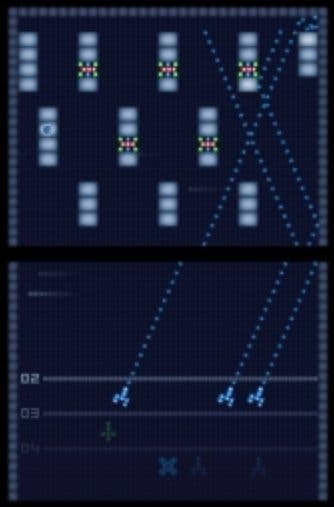Reflect Missile
Ballistic mirror.
A score is awarded for each stage, multipliers triggering when you manage to hit more than one target brick within a single shot. However, the real prize is reserved for completing a level with some spare artillery left over, and it's in securing the full set of these medals that the game's true longevity lies. It's one thing to simply solve a level, but quite another to do it on a budget.
Initially it appears as though the core idea isn't substantial enough to populate an entire game with interesting levels, but Q-Games keeps the formula fresh by way of power-up blocks that, for example, can be used to double the number of missiles you have on a particular turn. The game then becomes one of risk/reward, deciding whether the cost of using a missile to secure a power-up can be sufficiently recouped in subsequent turns. As a result the number of possible ways to complete each stage is surprisingly broad, and you'll find yourself starting and restarting particular stages many times over in search of the ideal solution.
Reflect Missile is not without its annoyances. Oftentimes just a single pixel divides the perfect shot from a disastrous one, and settling on the precise angle you want can be frustrating without the ability to nudge the missile arc left and right one pixel at a time with the d-pad. This niggle is exacerbated when playing on public transport, where even the slightest jog can ruin what was otherwise a perfect set of turns. Right from the beginning the game demands rare precision, and a little more effort in affording the player ease of suitable level of control would have been welcome.

While the package matches its utilitarian name with a sort of stark, prototype-style ambiance, it's anything but ungenerous, with no less than 200 stages available for those who can collect enough medals to unlock higher difficulties. A Quick Play mode removes the pressure of having to work through stark rows of stages, the game instead picking levels at random from each difficulty level's pot. But as with Slitherlink et al, much of the joy is to be found in the metagame of filling in the blanks with marks of completion.
This early into the DSiWare's existence, it's difficult to classify the sort of titles that will come to define the service. Reflect Missile, however, is a welcome possible answer to the question. More developed than a throwaway Flash game, yet less self-conscious and showy than a WiiWare or Xbox Live Arcade effort, it's a product that ignores the spectacle and bluster of gaming in order to more clearly celebrate the raw elegance of good design. As a result its ingenuity may be plainspoken and its perfections modest but neither can be reasonably denied.
